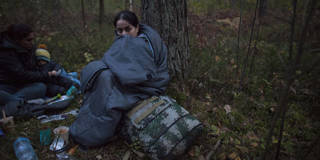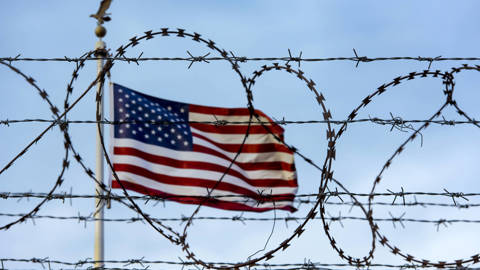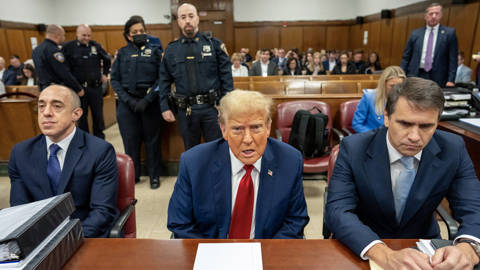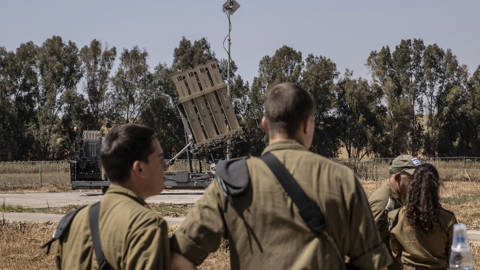Fear and Loathing in Poland
As in the past, refugees will be a key issue in Poland's election this month, because the ruling party wants it to be so. Law and Justice is betting that voters will succumb to their basest, most xenophobic instincts, rather than recognizing the parallels to one of the darkest periods in their country's history.
On the eve of Poland’s parliamentary elections, which pit opposition parties against an illiberal populist government in power since 2015, Polish historian Irena Grudzińska Gross sat down with the renowned Polish filmmaker Agnieszka Holland to discuss her latest production, Green Border, which won the Special Jury Prize at this year’s Venice Film Festival. A fictionalized account of the real-world experiences of asylum-seekers stranded on the Polish-Belarusian border in 2021, the film has become the bête noire of Poland’s populist government, and a welcome symbol of solidarity for Polish advocates of democracy and human rights. The shocking reality Green Border depicts continues, and people like those it portrays are still dying.
Irena Grudzińska Gross: Your latest film, Green Border, has received international acclaim and won important awards, and it has already been viewed by more than half a million people in Poland. But it also has been subjected to unprecedented attacks by Poland’s populist ruling party, Law and Justice (PiS), in the run-up to this month’s general election. Why?
Agnieszka Holland: During each election campaign, PiS leader Jarosław Kaczyński invents an enemy through which to harness public fear and anger. It was LGBT+ people during the last election, and refugees before that. Now that his anti-LGBT propaganda no longer arouses the same negative emotions as it once did, it is refugees’ turn again.
In 2021, the Belarusian dictator, Aleksandr Lukashenko, and Russian President Vladimir Putin came up with a new idea to destabilize Poland and the European Union. Their goal was to create an emigration corridor through Poland, Lithuania, and Latvia, through which they would shuttle migrants and asylum-seekers from the Middle East and North Africa.
For a while, the Polish authorities did nothing to curtail this practice, such as by demanding that the governments of the countries of origin prohibit the planes from departing. On the contrary, Kaczyński saw that a new “refugee crisis” played to his party’s advantage. For PiS, it was “political gold.” The government set about creating an atmosphere of fear and danger, saying monstrous things about the refugees: that they are zoophiles, that they travel with other people’s children, that they rape women while on Polish territory.
This is the typical behavior of illiberal regimes: stigmatization, dehumanization, and theater. In this case, the Polish government made a show of pushing migrants back across the border toward Belarus.
Huddled Masses
IGG: So, what happened to those refugees?
AH: Those who made it across the border found themselves in a huge forest, full of traps and hazards, swamps and rivers. They were completely unprepared for this, having been led to believe that a “cab” would pick them up and ferry them to Sweden, Germany, or the Netherlands.
The first group generally had family in Europe, and comprised mainly Syrians, Afghans, and Kurds from Iraq; then Africans joined them. Lukashenko advertised his Belarusian corridor as an easy and safe option, leading more people to flock there. It was not only healthy, single males but also a lot of families, children, old people, sick people, pregnant women. There was one boy with infantile paralysis, whose family was seeking medical care in the West.

SPRING SALE: Save 40% on all new Digital or Digital Plus subscriptions
Subscribe now to gain greater access to Project Syndicate – including every commentary and our entire On Point suite of subscriber-exclusive content – starting at just $49.99.
When Polish security services and police encountered these people in the woods, they were often in a terrible physical and mental state, and there had already been deaths from hypothermia, starvation, and so forth. The border guards would escort them away, often luring them with lies about traveling to Germany or to a guard post where their asylum papers would be filed. Once they reached the border, they would be shoved back over the barbed wire into Belarus – sometimes quite violently.
Helpless to defend themselves, most refugees were left begging not to be sent back to Belarus, especially those who had already experienced such expulsions before. Terrible things reportedly happened on the Belarusian side. There was talk of torture, even killings, though I was unable to document such cases.
I met a man who had been “flipped” across the border 26 times. He had become a shell of a human being, so full of humiliation and hatred that I thought to myself, “This is how terrorists are bred.” The entire experience was one of gratuitous cruelty. It most certainly could have been managed without tormenting and humiliating the asylum-seekers.
I included a few of these stories of sadistic behavior from Polish and Belarusian guards in Green Border. The situation confirmed what we have come to learn from history and psychology: namely, that if violence is condoned and rewarded by those at the top, people in positions of relative power will channel their worst impulses, and those with sadistic tendencies will indulge them at will.
IGG: Did the refugees receive at least some help from others?
AH: Yes, there was overt local help from the Michałowo municipality, the Podlaskie Humanitarian Service, and individual residents, as well as more hidden forms of assistance from others, such as local doctors and farmers. There were also activists from humanitarian aid groups with previous experience assisting refugees in camps in Greece and Italy.
Notably, apart from one group from the Club of Catholic Intelligentsia, there were no priests to be found. Worse, when some freezing and starved refugees knocked on church gates for help, the local priests called the border guards. In fact, one of the first documented fatalities was a young Syrian Christian named Issa – meaning Jesus – and he was not the only Christian who has died near that border.
Top-Down Xenophobia
IGG: What was PiS’s role in this, specifically?
AH: Kaczyński declared a kind of state of emergency, blocking access to the entire border territory for everyone but those who live there. That made it impossible for others to offer help, or for most journalists to document what was happening.
Kaczyński knew that he needed to keep public opinion from turning against him. He once argued that the United States lost the Vietnam War because so much of it was allowed to play out on TV. Americans back home saw naked children running away from napalmed villages, and they wanted nothing to do with it.
PiS came to power during the first refugee crisis, in 2015, when Syrians were fleeing civil war in massive numbers. Before that year’s election campaign, around 70% of Polish voters were willing to accept refugees. But after months of PiS hammering the issue with xenophobic scaremongering and even Nazi-style rhetoric (claiming that refugees carry “very dangerous diseases long absent from Europe”), the share of Poles willing to take in asylum-seekers dropped to 56%.
This episode is very instructive. At the time, many liberal politicians were afraid to oppose PiS’s racist propaganda, because they did not want to be accused of inviting a wave of refugees, or of turning Poland into another France, whose banlieues are riven with gang violence. This was when the racist, xenophobic narrative became dominant, and then entrenched.
IGG: Is that why you decided to make a film about refugees?
AH: I wanted Green Border to be a kind of provocation to the current government. It documents things that they have hitherto managed to hide and lie about. I tried to recreate what could not be seen.
But I am not naive. I know that the refugee issue is now one of the most important political problems facing all humanity, and certainly one of the most important threats to European cohesion (or to the cohesion of the rich world more broadly). It cannot be solved simply by helping one person here and another person there.
I know the history of the twentieth century quite well, especially the crimes against humanity committed in Europe. Having made multiple films on that subject, and having studied the 1930s very carefully, I knew that we were witnessing the early stages of something dangerous – the proverbial “snake egg” that was just beginning to hatch.
In the borderlands, PiS was creating a small laboratory of violence and lies. There may not have been any thought about extermination or pogroms, but this is how such things start, unless there is resistance. I am deeply convinced that by stigmatizing these people and trivializing the violence against them, we are gradually inching closer to a point of no return. It has happened before, and it can happen again.
Sadder Than Fiction
IGG: Is it correct to describe the film as fictional, but based on real events?
AH: I could not make a documentary, because the authorities had denied access for that. Though the film is two and a half hours long, it is still quite short for the story it tells. We tried to balance it so that it would be multi-sided and open-minded toward all involved. But, of course, I have no empathy for the obvious sadists.
IGG: Can you tell us more about your protagonists, and how you conceived of these characters?
AH: The story centers on a family from Syria that has already spent several years in a refugee camp. There are three children, a father, a mother, and a grandfather. They have a relative in Sweden who is trying to get them out. The father was tortured by Islamic State militants and no longer has any hope. But the mother wants to give their children a different life. Their relative has organized everything, paid for the tickets, and arranged transportation to and from the border. But the family falls into limbo in the forest – their phones run out of charge, they have no water or food, and they gradually descend into a deeper hell.
They are joined by an eccentric English teacher from Afghanistan, a lonely woman who clings to them, and who will play a sad role in the story. While a variety of other refugees make appearances, the focus remains primarily on this family.
A second plotline consists of a young border guard whose wife is very pregnant. We see him working on a new house, a home for his wife and future child. He is confronted with choices that he does not like, but he accepts that it is his duty to do things he does not want to do. We see him facing these micro-dilemmas, often doing nasty things but also discovering bits of goodness in himself.
A third plotline follows a group of activists, colorful characters from NGOs like the Granica Group. Yes, I often use real organizations and politicians’ real surnames. Some people don’t like it, but I see no reason to avoid it.
There is one heroine character, Julia, based on a couple of women I met in the border region of Podlasie. In the film, she is an addiction therapist who goes to the countryside to isolate herself. She has lost her husband to COVID, has no children, and now works remotely. The prototype (which is quite faithful in terms of the situation) is Elżbieta Podleśna, a well-known activist who also happened to go to Podlasie in search of spiritual solitude, and who ended up rescuing three Syrians from drowning in the marshes near her house. Worried about what might happen to them after law enforcement arrived, she kept her camera on.
Julia’s storyline is inspired by this real person. In the film, she joins a group of activists, but quickly realizes that providing help within the law does little good. Once you feed a refugee and give her water, dry clothes, and a power bank, you still have to leave her in the forest, where she will likely be “pushed back” after a few days. Julia comes to understand that when the state fails, she must assume its role. So, she goes rogue.
IGG: There are many situations in the film that remind me of iconic images from the Holocaust. Is this intentional?
AH: Everything shown really happened. But, yes, it is reminiscent of history, which is why I chose to render it in black and white. There is the scene of a person reciting the “Our Father” prayer to show that they are not foreigners. This reflects two cases I found where people who looked “ethnic” had to prove their Polishness. The young actors didn’t associate the scene with the Holocaust, because they didn’t know that this was how Jews defended themselves against blackmailers. I had to tell them about that history.
The guards seem equally ignorant of such associations. Yet the parallels are clear. For example, they feed deportees lies about going to Germany to coax them into trucks without resistance; then they brutally foist them back over the border. A young guard told us about such things off the record. When I asked him if people defended themselves when pushed across the border, he said no, they usually just cried and went like sheep. The world plays out this macabre theater over and over.
Red Seas
IGG: The film makes numerous references to the refugee situation across Europe, not only in Poland. Did you have in mind a larger humanitarian intervention?
AH: I didn’t want it to be a propaganda piece, even for the noblest of purposes. I wanted to show the complexity of the situation, and I wanted it to be interesting; propaganda campaigns are usually boring. I also wanted it to possess the artistic strength that would allow the viewer to go through this journey together with the characters. Yes, the situation around other European borders is no better. The Mediterranean Sea, so inviting for tourists, is also where tens of thousands of people have drowned. They are dying there now while you and I talk about it…
German Chancellor Angela Merkel’s welcoming of refugees in 2015 triggered a rise in xenophobic sentiments and populist, para-fascist parties across Europe. After that, dictators like Putin and Lukashenko began to take advantage of this radicalization, thereby ensuring that it deepened and became more entrenched.
But the refugee problem is global. It will intensify with the climate crisis and as a result of Europe’s irresponsible policies toward the Middle East and Africa. The fear of losing identity, modern comforts, and resources is so great that it cannot fail to produce more consent for mass violence. In Poland, Janusz Korwin-Mikke of the Konfederacja Party has said outright that male refugees should be killed, and women locked up in concentration camps. This is a member of parliament, yet such statements no longer surprise us.
In 2015, I attended a meeting in Norway alongside the great Norwegian actress Liv Ullmann. I remember remarking that the EU’s policy toward refugees was so cowardly and inadequate that the Mediterranean Sea would soon turn into a red sea. Everyone reacted with horror, asking, “How could you say such a thing?” Now, such observations are cliché.
The Smear Campaign
IGG: Let’s return to your personal situation. How would you characterize the PiS attacks against you?
AH: It is interesting to see how Poles glue themselves to history, like in some popular historical re-enactment groups. The recent insults against me have invoked two neighboring totalitarianisms. First, I was a Nazi propagandist like Goebbels; then, someone more educated – the journalist Bronisław Wildstein – compared me to the Nazi propaganda filmmaker Leni Riefenstahl; then came the switch, where I was declared a Stalinist or a “useful idiot.”
The people saying these things had not seen the film, by the way. After delivering a paean to the border guards, Polish President Andrzej Duda announced that he had not and would never watch it. He then quoted a slogan from the German occupation of Poland in World War II: “Only pigs sit in the cinema.” Politically, this seems unwise. Apparently, the president thinks that the half-million people who have seen it are pigs.
Then the authorities came up with the idea of requiring theaters to air a propaganda spot before each screening. I saw this spot, and I can tell you that it is very weak. Moreover, the idea that people who have already decided to go see this movie will swallow such nonsense is quite stupid.
In any case, most theaters said they were not interested in airing propaganda. The government then responded by saying they must do it, and that they would be paid. Now, some declared they will be airing it and donating the proceeds to the Granica Group. Poles love such little acts of sabotage. Memes, posters, and T-shirts are circulating, and people are grunting like pigs. It has become a new source of solidarity.
True, all of this implies even deeper political polarization. But I have never harbored any illusion that people prone to dehumanizing others would be susceptible to changing their mind after seeing a film.
IGG: I notice that you have not mentioned anti-Semitism in these attacks.
AH: There were, of course, elements of anti-Semitism, with many attacks referring to my father. In the 1930s, he was a young communist Jew who was accepted to study medicine. But being only 19 years old when the war broke out, he went east, enlisted in the Red Army when Germany attacked the Soviet Union, and then joined the Red Army’s Polish Unit, led by General Zygmunt Berling. The implication is that I am prepared to betray Poland, because I carry treachery in my genes. These anti-Semitic strains tend not to be expressed directly, except in social-media memes, but the message is clear: my Jewishness means that I am not truly Polish.
After being at the center of this intensifying campaign of hate and pogrom-like threats, I split. I wanted to be in Poland for the film’s premiere and the elections, but I didn’t want to expose myself. It already felt stupid walking around in my own country with a security detail (which costs quite a lot, mind you).
Instead, I took these haters to court, suing Minister of Justice Zbigniew Ziobro for defamation. The judge, who showed great courage, barred Ziobro from talking about me anymore. Ziobro said he didn’t care about the court’s judgment; that he cares only about the Last Judgment – this from the minister of justice!
At first, they were satisfied with their campaign against me, boasting that it had a high click rate. But our side, meanwhile, has become very united. The film introduced a noble cause to gather around. Previously, we had built mainly a negative narrative – focusing on what is wrong with PiS – because we feared saying something that could be exploited and used against us. People didn’t have a sense of the sublime, or anything like the solidarity that has been created around the film.
Now, people in theaters applaud after the screenings, even though none of the filmmakers is there. Many people have told me that things simply were not the same for them after seeing it. This makes me very happy. It turns out that my profession is worth pursuing – something I had begun to doubt in recent years.
Clinging to the Good
IGG: Should we think of Green Border as a return to the beginnings of your filmmaking path in the communist era, to the so-called “Cinema of Moral Unrest”?
AH: Someone did describe this latest film as a cry of moral unrest, and it does indeed come from anger and helplessness, as was the case back then. But it rests even more firmly on the need for a cool-headed analysis of how people will act in borderline situations. So, it’s closer to the feeling I had when I was making films about the Holocaust. Those were created not only to honor the victims or to show what happened, but also to warn that such horrors had not disappeared, that they could reawaken. For a while, the Holocaust inoculated us against the pull of nationalism or racism. The EU was created largely as a laboratory for administering this vaccine. But now a booster is needed.
IGG: Now you are preparing to make a film about Kafka. How does that relate to your recent experience? The attacks against you certainly were Kafkaesque.
AH: Those who came out of communism – out of regimes that made Kafka look prophetic – are somehow accustomed to such absurdity. Stalin’s show trials and great purges were as absurd as The Trial. But Kafka also is deeper and more mysterious. His work does not explain anything outright, but it gets under the skin and becomes actualized as an image of how such regimes operate.
But I do not want to end our conversation with Kafka. I prefer to conclude with a quote from Soviet author Vasily Grossman’s novel Life and Fate: “The history of mankind is not a struggle between good and evil. The history of mankind is a struggle between evil and the tiny grain of humanity in people. As long as humanity is not completely killed within them, evil will never prevail.”




